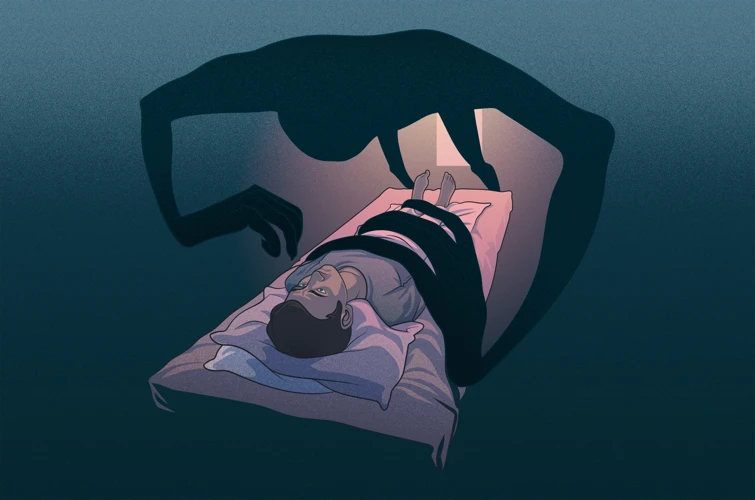Have you ever experienced a state where you feel engulfed by fear, unable to move, and sense a menacing presence in your room? If yes, then there is a high probability that you have experienced sleep paralysis. This is a phenomenon that affects a significant portion of the population, yet it remains wrapped in mystery for many. The feeling of being trapped in your own body while a sinister force looms over you can be perplexing, and it is hard to determine what causes this occurrence. In this article, we will explore the causes and symptoms of sleep paralysis, as well as discuss diagnosis, treatment, coping strategies, and prevention tips for this condition. So, if you have experienced sleep paralysis or are interested in learning more about it, keep reading.
What is Sleep Paralysis?
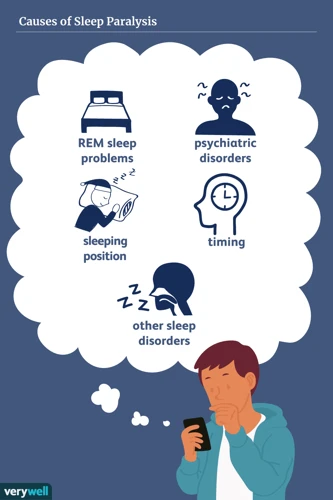
Have you ever woken up in the middle of the night, unable to move or speak? It can be a terrifying experience, leaving you feeling vulnerable and confused. It’s possible that you experienced sleep paralysis, a condition that affects the body’s ability to move or react during sleep. Understanding the concept of sleep paralysis can help you recognize the symptoms and find ways to cope with it. Let’s take a closer look at what sleep paralysis is and how it can affect you.
Explaining Sleep Paralysis
Sleep paralysis is a phenomenon that occurs when a person cannot move their body or speak while falling asleep or waking up. This can be a very scary experience for those who are unfamiliar with it. There are two types of sleep paralysis, each with its own unique characteristics.
| Type | Description |
|---|---|
| Isolated Sleep Paralysis | Occurs without any underlying medical condition. It can happen to anyone at any time, but is more common in people with sleep disorders. |
| Recurrent Isolated Sleep Paralysis | Occurs more than once in a person’s lifetime. It can be caused by a variety of factors, including genetics, stress, sleep deprivation or underlying medical conditions. |
Regardless of the type, sleep paralysis is thought to be caused by a disruption of the body’s natural sleep-wake cycle. During normal sleep, the body goes through several stages of sleep, including REM (Rapid Eye Movement) sleep, which is associated with dreaming. During REM sleep, the body’s muscles are typically paralyzed to prevent acting out dreams. However, during sleep paralysis, the person’s mind wakes up while their body is still in REM sleep, leaving them temporarily unable to move or speak.
Sleep paralysis can be accompanied by vivid hallucinations, often of a disturbing or fearful nature. These hallucinations, which can be auditory, visual or tactile, may add to the feeling of terror experienced by those who suffer from sleep paralysis.
While sleep paralysis itself is not harmful, the intense fear and anxiety that often accompanies it can disrupt a person’s sleep patterns, leading to daytime fatigue and other health issues. It is important to seek treatment if sleep paralysis is causing significant distress or interfering with daily life.
Types of Sleep Paralysis
Sleep paralysis may occur in two different forms, which are isolated sleep paralysis and recurrent sleep paralysis.
Isolated sleep paralysis refers to the experience of sleep paralysis occurring only once in a person’s life. This type can occur in individuals who are experiencing disrupted sleep schedules or periods of high stress. People with isolated sleep paralysis may not require any specific treatment, aside from addressing the underlying cause of their disrupted sleep.
Recurrent sleep paralysis, on the other hand, refers to ongoing episodes of sleep paralysis. This type is typically associated with underlying sleep disorders such as narcolepsy, where people experience sudden, uncontrollable bouts of sleep during the day. Recurrent sleep paralysis is considered a symptom of narcolepsy and other sleep disorders, and requires treatment of the underlying condition in order to effectively manage the symptoms.
It is important to note that while these two types of sleep paralysis have different causes, they can both be equally distressing for individuals who experience them. If you or a loved one is experiencing frequent episodes of sleep paralysis or other sleep disturbances, it is important to seek medical attention to determine the underlying cause and develop a personalized treatment plan.
The Causes of Sleep Paralysis
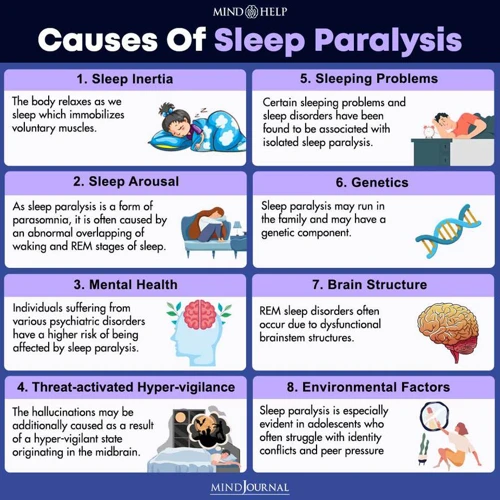
Understanding the underlying causes of sleep paralysis can be a perplexing issue for those who suffer from it. While the root cause of sleep paralysis is not fully understood, certain risk factors have been identified that contribute to its development. In this section, we will delve into the various factors that can lead to sleep paralysis, including sleep disorders, stress, anxiety, and substance abuse. By exploring these causes, readers can gain a better understanding of how sleep paralysis occurs and what can be done to prevent it.
Sleep Disorders
Sleep disorders can be a major contributor to sleep paralysis. These disorders often prevent people from falling asleep or maintaining a healthy sleep schedule, leading to irregular and disturbed sleep patterns.
There are several types of sleep disorders that can result in sleep paralysis. Let’s take a closer look at each of them:
| Sleep Disorder | Description |
|---|---|
| Insomnia | Difficulty falling asleep or staying asleep, leading to sleep deprivation and exhaustion. |
| Narcolepsy | A chronic neurological disorder that affects the brain’s ability to control sleep-wake cycles, resulting in sudden and unpredictable episodes of sleep, sometimes accompanied by hallucinations and sleep paralysis. |
| Obstructive Sleep Apnea | A breathing disorder that causes repeated episodes of interrupted breathing during sleep, leading to decreased oxygen levels in the body and frequent awakenings throughout the night. |
| Restless Leg Syndrome | An uncomfortable sensation in the legs, often described as a crawling, tingling or burning sensation, that leads to an irresistible urge to move the legs, disrupting sleep. |
It’s important to note that not everyone with a sleep disorder will experience sleep paralysis, and not everyone with sleep paralysis will have a sleep disorder. However, if you are experiencing sleep paralysis on a regular basis, it may be worth discussing the possibility of an underlying sleep disorder with a healthcare professional.
Stress and Anxiety
Stress and anxiety are common triggers for sleep paralysis. When a person experiences stress or anxiety, their body can enter a state of hyperarousal, which can disrupt their sleep pattern and increase the likelihood of experiencing sleep paralysis. Additionally, stress and anxiety can cause an increase in adrenaline levels, which can make a person more susceptible to sleep paralysis.
There are several factors that can contribute to stress and anxiety, including work or school-related pressures, financial worries, relationship issues, and traumatic events. These factors can lead to feelings of anxiety, fear, and panic, which can be exacerbated during sleep.
Research has shown that individuals who experience high levels of stress or anxiety are more likely to experience sleep disturbances, including sleep paralysis. A study conducted by the University of Pennsylvania found that individuals who reported high levels of stress were more likely to experience sleep paralysis. Additionally, the study found that individuals who experienced sleep paralysis were more likely to report symptoms of anxiety and depression.
It is important for individuals who experience stress and anxiety to address these issues in order to reduce their risk of experiencing sleep paralysis. This may involve seeking therapy, practicing relaxation techniques such as meditation or yoga, or making lifestyle changes such as reducing caffeine intake, avoiding screens before bedtime, and establishing a regular sleep routine.
| Causes of Stress and Anxiety | Effects on Sleep Paralysis |
|---|---|
| Work or school-related pressures | Increased likelihood of experiencing sleep paralysis |
| Financial worries | Disrupts sleep pattern and can increase the risk of sleep paralysis |
| Relationship issues | Causes feelings of anxiety, fear, and panic which can be exacerbated during sleep |
| Traumatic events | Can lead to symptoms of anxiety, depression and increase the risk of sleep disturbances such as sleep paralysis |
Substance Abuse
The use of substances such as alcohol, drugs, and medications can contribute to sleep paralysis. These substances can affect the normal REM sleep cycle, leading to disruptions that cause sleep paralysis. Let’s take a closer look at each of these substances and how they can impact sleep paralysis.
| Substance | Impact on Sleep Paralysis |
|---|---|
| Alcohol | Alcohol can disrupt the normal sleep cycle and prevent the body from reaching deep sleep stages. This can cause more frequent occurrences of sleep paralysis. |
| Drugs | Some recreational drugs, such as cocaine and amphetamines, can interfere with normal sleep patterns, leading to an increased risk of sleep paralysis. Prescription medications such as certain antidepressants and antipsychotics may also cause sleep paralysis. |
| Medications | Certain medications can disrupt the REM sleep cycle and increase the likelihood of sleep paralysis. These include medications used to treat allergies, asthma, and high blood pressure. |
It is important to note that substance abuse can also contribute to other sleep disorders and conditions that may increase the likelihood of experiencing sleep paralysis. If you or someone you know is struggling with substance abuse, it is important to seek professional help to address the issue and improve overall sleep health.
Symptoms of Sleep Paralysis
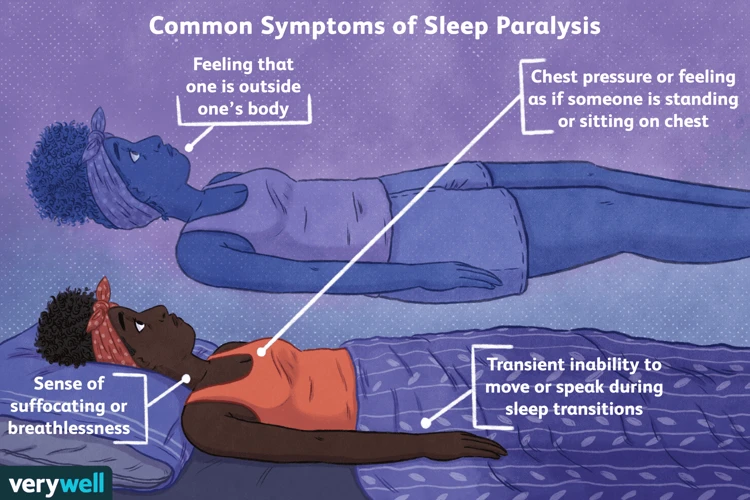
For those who experience it, sleep paralysis can be a terrifying and bewildering phenomenon. The feeling of being unable to move or speak while still cognizant of one’s surroundings can be accompanied by a range of physical and mental symptoms that can leave one feeling disoriented and anxious. In this section, we will explore the various symptoms that individuals with sleep paralysis may experience, both physically and mentally.
Physical Symptoms
The physical symptoms associated with sleep paralysis can vary from person to person. However, there are some common physical experiences that individuals with sleep paralysis report. Some of these symptoms include:
- Immobilization: Sleep paralysis is characterized by immobilization, meaning that you are unable to move your body or limbs. This can be a frightening experience for individuals, as they may feel trapped in their own body.
- Difficulty Breathing: During sleep paralysis, some individuals may experience difficulty breathing. This can be due to the fact that they are unable to move their chest muscles or open their mouth to take in air.
- Pressure on Chest: Another common physical symptom of sleep paralysis is the sensation of pressure on the chest. This can be a frightening experience for individuals, as they may feel as though they are having a heart attack or are unable to breathe.
- Visual Hallucinations: During sleep paralysis, some individuals may experience visual hallucinations. They may see frightening images or people in the room with them, even though they know they are alone.
- Tingling and Vibrating Sensations: It is not uncommon for individuals with sleep paralysis to experience tingling or vibrating sensations throughout their body. This can be a result of the body’s attempts to wake up and can be a sign that the episode is coming to an end.
It is important to note that while these physical symptoms can be frightening, they do not put individuals in danger. While they can be terrifying, it is important to know that sleep paralysis is not harmful and does not cause any physical harm to the body.
Mental Symptoms
Sleep paralysis not only affects the physical body, but it also has an impact on the mental health of individuals experiencing this condition. The mental symptoms of sleep paralysis can cause anxiety, fear, and even depression.
Below is an overview of some of the common mental symptoms associated with sleep paralysis:
| Mental Symptoms of Sleep Paralysis | Description |
|---|---|
| Intense Fear | Individuals with sleep paralysis often report feeling an intense sense of fear or dread. They may feel as if there is a malevolent presence in the room with them or that they are being held down by an unseen force. |
| Anxiety | The experience of sleep paralysis can be so distressing that it can lead to anxiety in some individuals. They may fear going to sleep at night or avoid sleeping altogether, which can lead to a range of health issues. |
| Depression | Living with sleep paralysis can be a draining experience, and some individuals may experience feelings of helplessness, worthlessness, or hopelessness as a result. These feelings can lead to depression, which can, in turn, exacerbate sleep paralysis symptoms. |
| Post-Traumatic Stress Disorder (PTSD) | For some individuals, the experience of sleep paralysis can trigger symptoms of PTSD, such as flashbacks or nightmares. This can be a particularly difficult symptom to manage and requires specialized treatment. |
It is worth noting that these mental symptoms are often intertwined with the physical sensations of sleep paralysis. For example, the intense fear that many individuals experience during sleep paralysis can contribute to the feeling of being unable to move or speak. Additionally, anxiety and depression can exacerbate physical symptoms, making it even harder to break free from a sleep paralysis episode.
It is important for individuals experiencing these mental symptoms to seek support from qualified mental health professionals. A variety of therapies, such as cognitive-behavioral therapy and exposure therapy, can be effective in managing the mental health impact of sleep paralysis.
Diagnosis and Treatment
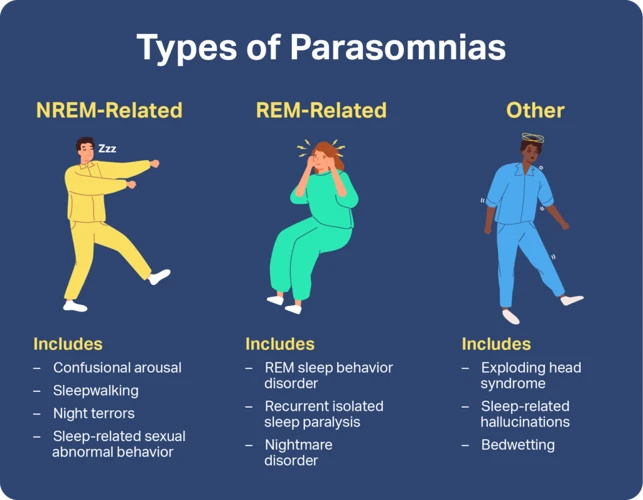
When faced with the frightening experience of sleep paralysis, it’s important to seek proper diagnosis and treatment. A proper diagnosis can ensure that you receive the appropriate treatment to help manage your symptoms, while effective coping strategies can improve your quality of sleep and overall well-being. Let’s explore the different diagnostic methods and treatments for sleep paralysis, as well as the coping strategies that can be used to help you live a peaceful life.
Diagnosis
In order to diagnose sleep paralysis, a doctor will typically conduct a thorough medical history review and physical examination. This is done to identify any underlying conditions that may be causing or contributing to the sleep paralysis.
The doctor may also perform diagnostic tests, such as a polysomnogram or a multiple sleep latency test, to measure brain waves, muscle movements and other physiological responses during sleep. These tests can help to identify any disruptions in sleep patterns that could be associated with sleep paralysis.
Medical History Review
During the medical history review, the doctor will ask the patient about their sleep habits, medical history, medications or supplements they are currently taking, and any other relevant information that could help to identify possible causes of sleep paralysis.
Physical Examination
The physical examination typically involves checking for any signs of physical or neurological abnormalities that could be contributing to the sleep paralysis. This may include assessing muscle strength and reflexes, as well as evaluating the patient’s overall health status.
Polysomnogram
A polysomnogram, also known as a sleep study, is a diagnostic test that involves monitoring various physiological parameters during sleep. This may include brain wave activity, eye movements, muscle tone, and heart rate.
Multiple Sleep Latency Test
A multiple sleep latency test is a diagnostic test that involves measuring the time it takes for a person to fall asleep during the day. This test can help to identify any disruptions in sleep patterns that may be associated with sleep paralysis.
A diagnosis of sleep paralysis is typically based on a combination of medical history, physical examination and diagnostic tests. It is important to see a doctor if you are experiencing symptoms of sleep paralysis, as they can help to identify any underlying conditions and develop an appropriate treatment plan.
Treatment
Treatment options for sleep paralysis vary depending on the severity of the condition and individual circumstances. Some possible treatments include:
- Sleep hygiene: Improving overall sleep habits such as having a consistent sleep schedule, avoiding caffeine or alcohol before bed, and creating a comfortable sleep environment can reduce the likelihood of sleep paralysis occurring.
- Stress management: Since stress and anxiety can trigger sleep paralysis, finding effective ways to manage stress such as meditation, therapy, or exercise may help reduce its frequency.
- Medication: In some cases, medication may be prescribed to manage underlying disorders or to regulate sleep patterns. However, this should only be done under the guidance of a healthcare professional.
- CPAP machine: For individuals who experience sleep paralysis as a result of obstructive sleep apnea, a continuous positive airway pressure (CPAP) machine may be recommended to improve breathing during sleep.
- Imagery Rehearsal Therapy (IRT): This therapy involves reimagining the dream in which the sleep paralysis occurs and ending it with a positive outcome. This technique has been found effective in reducing the frequency of sleep paralysis episodes.
It is important to seek professional help if sleep paralysis is causing distress or negatively impacting daily life. A healthcare provider can evaluate individual symptoms and recommend appropriate treatment options.
Coping Strategies
Dealing with sleep paralysis can be a challenging experience, but there are coping strategies that can help individuals manage the symptoms. Here are some strategies that can be employed to deal with sleep paralysis:
- Identifying Triggers: It can be helpful to identify the triggers that might be causing sleep paralysis. Make note of what’s going on in your life, your stress levels, your sleep habits, and other factors that might be contributing to your symptoms.
- Relaxation Techniques: Relaxation techniques like deep breathing, meditation, or yoga can help to relieve stress and calm the mind, which can aid in reducing the frequency and severity of sleep paralysis.
- Improve Sleep Habits: Maintaining a regular sleep schedule, getting at least 7-8 hours of sleep each night, creating a comfortable sleep environment, and avoiding caffeine or alcohol before bedtime can help to minimize the chances of experiencing sleep paralysis.
- Seek Support: Talking to a therapist, counseling, or seeking support from loved ones can help individuals better cope with the anxiety and fear that comes with sleep paralysis.
- Stay Calm: If you do experience sleep paralysis, it’s important to stay calm and avoid intense emotions like fear, anger, or frustration. Remind yourself that the episode will pass soon, and it’s not life-threatening.
- Focus on Positive Thoughts: Instead of dwelling on negative thoughts, try to focus on positive affirmations, happy memories, or other pleasant thoughts that might distract you from the sensation of being paralyzed.
Remember, coping strategies for sleep paralysis can vary from person to person. Some techniques may work better for some individuals compared to others. Identifying the right coping strategies for oneself can require some trial and error, but with a little patience and persistence, sleep paralysis can be successfully managed.
Prevention Tips
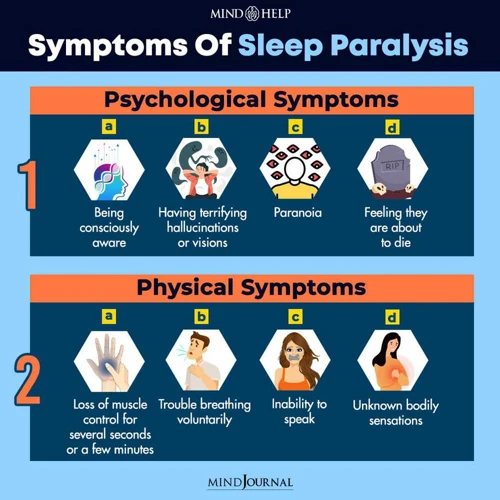
There are several measures a person can take to prevent sleep paralysis. Establishing and maintaining a regular sleep schedule is one of the most significant preventive measures. Going to bed and waking up at the same time every day trains the body to regulate itself efficiently, which can minimize the likelihood of experiencing sleep paralysis.
In addition, reducing stress and anxiety is another essential step to prevent sleep paralysis, as these factors are known to increase the risk of experiencing the condition. Engaging in stress-reducing activities such as meditation, yoga, and deep breathing can help alleviate anxiety and reduce the likelihood of experiencing sleep paralysis.
Another useful prevention tip is to avoid consuming substances that can adversely affect your sleep patterns, such as caffeine, nicotine, and alcohol. These substances can interfere with the body’s natural sleep cycle, leading to disrupted sleep patterns and increasing the likelihood of experiencing sleep paralysis.
Additionally, creating a comfortable sleep environment is vital for preventing sleep paralysis. A comfortable sleep environment is conducive to sleeping well, which lowers the risk of experiencing sleep paralysis. Ensure that your sleeping area is cool, quiet, and dark. Use comfortable pillows and supportive mattresses and avoid doing activities like watching TV or working while in bed.
Finally, it is crucial to avoid sleeping on your back to prevent sleep paralysis. This sleep position can cause the tongue to block the airways, leading to obstructive sleep apnea, which could increase the chances of experiencing sleep paralysis. Sleep experts recommend sleeping on your side or stomach to minimize the likelihood of experiencing sleep paralysis.
By following these preventive tips, a person can minimize the likelihood of experiencing sleep paralysis and enjoy better quality sleep.
When to See a Doctor
If you experience sleep paralysis frequently or it interferes with your daily life, it’s important to seek medical attention. Seeking medical attention is also crucial if you have other symptoms that are concerning or if you suspect an underlying medical condition may be causing your sleep paralysis.
Additionally, if you have never experienced sleep paralysis before and suddenly experience it along with other symptoms such as chest pain or difficulty breathing, seek emergency medical help immediately. These symptoms could be signs of a more serious condition such as sleep apnea or a panic attack.
It’s important to be open and honest with your doctor about your sleep paralysis symptoms, including how often they occur and how they impact your daily life. Your doctor may refer you to a sleep specialist for further evaluation and treatment.
Remember, sleep paralysis is a common and usually harmless condition, but it’s always better to err on the side of caution and seek medical attention if you have any concerns. Your doctor can help you manage your symptoms and improve your overall sleep health.
Conclusion
In conclusion, sleep paralysis can be a frightening and confusing experience for those who go through it. It can be caused by various factors including sleep disorders, stress, anxiety, and substance abuse. The symptoms of sleep paralysis can range from physical symptoms such as the inability to move the body to mental symptoms such as hallucinations and feelings of terror.
While there is no one specific cure for sleep paralysis, there are various coping strategies and treatments available to alleviate the symptoms. These include improving sleep hygiene, practicing relaxation techniques, and seeking professional help in the form of therapies or medication. It is important to understand that sleep paralysis is a medical condition and seeking help from a healthcare professional is crucial in order to prevent potential long-term effects.
Sleep paralysis should not be ignored or dismissed, as it can impact one’s mental and physical well-being. It is important to take preventative measures to avoid triggering episodes of sleep paralysis, such as maintaining a regular sleep schedule and avoiding substance abuse. If you experience sleep paralysis, there is no need to suffer in silence. Seek the help and support you need to manage this condition, and improve your overall quality of life.
Frequently Asked Questions
What is hypnagogic hallucination and how it is related to sleep paralysis?
Hypnagogic hallucination is the experience of seeing or hearing things when falling asleep or waking up. They can be directly linked to sleep paralysis and often occur alongside it.
Is sleep paralysis dangerous?
No, sleep paralysis is not dangerous in itself. However, it can cause significant distress and interfere with a person’s quality of life.
Can sleep paralysis be inherited?
There is evidence to suggest that sleep paralysis may have a genetic component, although more research is needed to fully understand the role genetics play.
Does medication exist to treat sleep paralysis?
There is no medication specifically designed to treat sleep paralysis. However, treating underlying sleep disorders or anxiety may reduce the frequency of episodes.
Can sleep paralysis be a symptom of other medical conditions?
Sleep paralysis can sometimes be a symptom of other medical or psychiatric conditions, including narcolepsy, bipolar disorder, and post-traumatic stress disorder (PTSD).
Does everyone experience sleep paralysis?
No, not everyone experiences sleep paralysis. It is estimated that around 8% of the population experiences sleep paralysis at some point in their lives.
Is it possible to move during sleep paralysis?
During sleep paralysis, the body is temporarily immobilized. It is not physically possible to move until the paralysis wears off.
Can sleep paralysis occur during daytime naps?
Yes, sleep paralysis can occur during daytime naps as well as during nighttime sleep.
Can changing sleep habits prevent sleep paralysis?
Improving sleep habits, such as avoiding caffeine and creating a regular sleep schedule, may reduce the frequency of sleep paralysis episodes.
Are there any natural remedies for sleep paralysis?
While there is no cure for sleep paralysis, relaxation techniques, such as deep breathing and meditation, may help reduce anxiety and prevent episodes.

